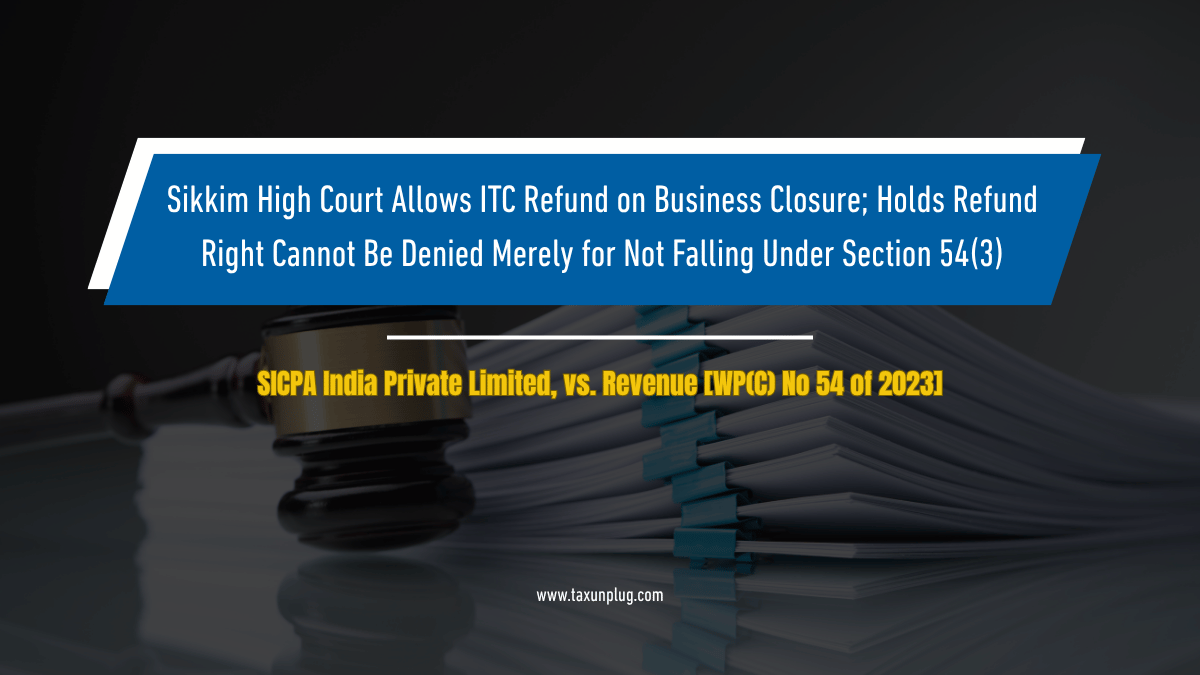Sikkim High Court Allows ITC Refund
SICPA India Private Limited, vs. Revenue [WP(C) No 54 of 2023]
Background of the Case
The Appellant, SICPA India Private Limited had been operating in the State of Sikkim under the erstwhile Sikkim Industrial Policy, manufacturing excise duty-free products. Upon closure of their factory operations in the State, the appellant filed an application for refund of the unutilized balance of Input Tax Credit (ITC) amounting to Rs. 4,37,42,562 lying in their Electronic Credit Ledger under the CGST Act, 2017.
The refund application was rejected by the Assistant Commissioner, who opined that refund of unutilized ITC could only be allowed under the two specific conditions outlined in the first proviso to Section 54(3) of the CGST Act—namely, (i) zero-rated supplies made without payment of tax or (ii) an inverted duty structure. The Appellate Authority of GST upheld this rejection on appeal. Aggrieved, the Appellant approached the High Court under Article 226 of the Constitution seeking relief.
Arguments by the Appellant
The Appellant argued that the rejection of the refund claim was legally unsustainable and based on an incorrect and narrow interpretation of Section 54(3) of the CGST Act. They emphasized that the plain language of Section 49(6) of the CGST Act allows a registered person to claim refund of any balance in the electronic credit ledger, subject to conditions and restrictions as may be prescribed. Further the appellant stated that section 54(3), while it provides for refund in cases of zero-rated supplies and inverted duty structure, does not contain a non-obstante clause nor a prohibition against granting refunds in other scenarios. The Appellant relied on the doctrine of vested rights, highlighting that ITC legitimately earned under the law becomes a property right and cannot be denied merely on the technical ground that business operations have ceased.
The Appellant also relied on judgements such as Eicher Motors Ltd. v. Union of India (1999) 2 SCC 361 were cited to reinforce that tax credits legally accrued under the law are not a concession but a right and must be refunded when they become incapable of being utilized due to closure or other legitimate reasons.
Respondent’s Response
The Revenue contested the appellant’s plea by preliminary objection regarding maintainability of the writ petition, contending that an alternate statutory remedy was available to the Petitioner under Section 112 of the CGST Act, which provides for appeal before the Appellate Tribunal. The Respondents argued that section 54(3) is the sole provision governing refund of unutilized ITC and is exhaustive in nature, permitting refunds only under the two circumstances listed therein. The Respondent further stated that the Appellant’s case—where the refund was claimed due to business closure—did not fall under either category listed in Section 54(3), and hence, refund could not be allowed. They also contended that Section 49(6) is subject to Section 54, and therefore cannot be independently used to justify refund outside the prescribed scenarios.
Court Findings and Decision
The Hon’ble High Court of Sikkim, rejected the preliminary objection on maintainability. The Court held that when substantial questions of law arise—such as the interpretation of statutory provisions—the writ jurisdiction under Article 226 cannot be ousted merely on the existence of an alternate remedy, especially when no appellate tribunal was operational at the time. The Court stated that section 49(6) of the CGST Act permits refund of any balance in the electronic credit ledger and must be interpreted harmoniously with Section 54. The absence of a prohibition in Section 54(3) against refunds in other circumstances indicates that other forms of refund are not excluded. The Court observed that business closure is a valid and genuine ground, and disallowing refund of accumulated credit in such a scenario would amount to confiscation of property without authority of law, violating Article 300A of the Constitution.
Relying on the precedents cited, the Court reiterated that credit accrued on input taxes is an indefeasible right, and a taxpayer cannot be penalized or denied a refund simply because they are unable to utilize such credit due to cessation of business operations. The High Court thus allowed the petition and directed the Respondents to process and sanction the refund of Rs. 4.37 crores to the appellant within eight weeks.
Sikkim High Court Allows ITC Refund
To download official order, Click Here
“The site is for information purposes only and does not provide legal advice of any sort. Viewing this site, receipt of information contained on this site, or the transmission of information from or to this site does not constitute an attorney-client relationship. The information on this site is not intended to be a substitute for professional advice.”

